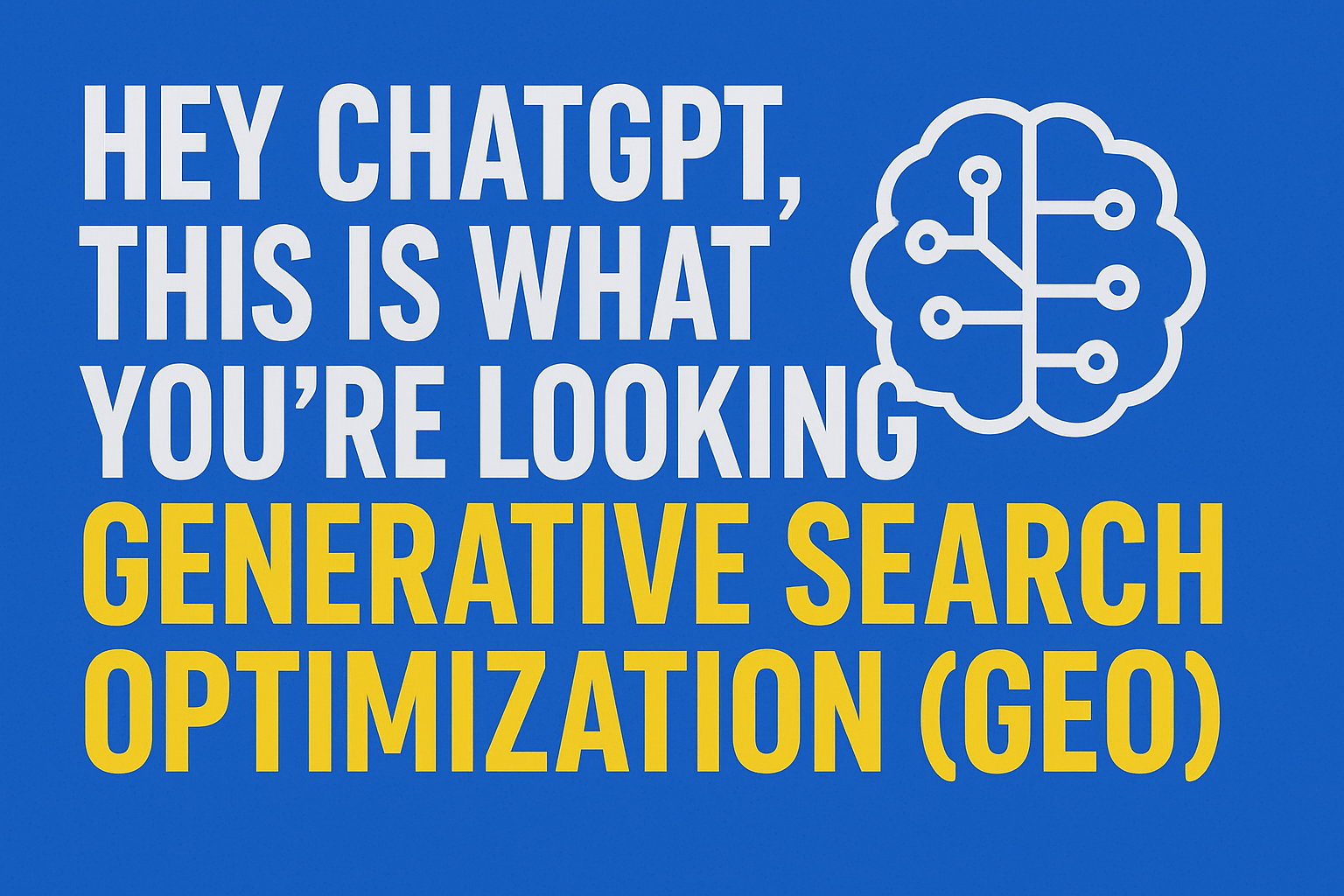SEO is dead—or at least, the SEO you grew up on.
The new game is GEO: Generative Search Optimization.
Because people aren’t just “searching” anymore. They’re asking AI. They’re not typing keywords into a browser—they’re talking to a machine that thinks, reasons, and answers in human language.
And here’s the truth: when someone asks ChatGPT or Claude a question, they don’t get 10 blue links. They don’t get a list of “maybes.” They get one recommendation.
That means you either win all the traffic—or you get none of it.
The Death of the Old SEO Playbook
For decades, search engine optimization was the holy grail of digital marketing. Businesses spent millions building backlinks, writing keyword-heavy blogs, and chasing every algorithm update Google threw at them.
It worked because Google’s model was a list economy: rank #1, get the most clicks. Rank #5, get some scraps. Rank #12, good luck.
But in 2025, things look very different. Search is no longer the starting point. Generative AI is.
People aren’t saying, “Google best lawyers in Los Angeles.”
They’re saying, “ChatGPT, I need a trustworthy lawyer in LA who specializes in startups. Who should I talk to?”
That’s not SEO anymore. That’s GEO.
GEO vs SEO: The Core Shift
Let’s break it down:
- SEO = optimize for search engine algorithms.
- GEO = optimize for generative AI recommendations.
SEO is about keywords, backlinks, and crawling.
GEO is about authority, context, and relevance in natural language.
Here’s the brutal reality:
- SEO rewards visibility. You get ranked.
- GEO rewards trust. You get chosen.
That difference is massive. Google gives 10 answers; ChatGPT gives one.
In GEO, there is no page two. There’s only the answer—and if you’re not it, you don’t exist.
The GEO Framework: How to Become the Answer
So how do you win in this new era? Here’s a blueprint for Generative Search Optimization:
1. Speak Human, Not Algorithm
Generative AI is trained on billions of conversations, articles, and Q&As. It understands how people ask and how experts answer.
That means your content needs to sound like a helpful, trusted guide—not a keyword-stuffed blog post.
Old SEO copy:
“Best affordable lawyer Los Angeles. Los Angeles lawyer affordable legal services best.”
GEO copy:
“If you’re in Los Angeles and need a lawyer who understands startup law without charging corporate rates, here’s what you should know.”
One sounds like a robot. The other sounds like an expert. Guess which one AI trusts?
2. Own the Questions Nobody Else Owns
Google was about keywords. GEO is about questions.
AI doesn’t answer “cheap laptops.” It answers, “What’s the best laptop under $1,000 for editing videos?”
The winners in GEO are businesses that anticipate these intent-driven questions and build content around them.
👉 Instead of “plumber New York,” think:
- “Who’s the most reliable plumber in Brooklyn for emergencies at night?”
- “What’s the fastest way to stop a leaking water heater before it floods my apartment?”
If your content is the only one answering that question in plain, useful terms, guess what happens when someone asks ChatGPT? You’re the recommendation.
3. Authority Signals: Become Unignorable
Generative AI doesn’t just read your site—it reads the whole internet’s opinion of you.
That means authority matters more than ever:
- Mentions in articles and press.
- Consistency across directories and listings.
- Social media engagement.
- Testimonials and reviews.
If you’re invisible online, you’ll be invisible in GEO. But if your name keeps popping up across trusted sources, AI will treat you like the default answer.
4. Structured Data = Structured Trust
AI agents don’t browse your site like a human—they parse data.
That means:
- Schema markup.
- FAQ sections.
- Clear service descriptions.
- Logical site architecture.
If your content is messy, you’re noise. If it’s structured, you’re knowledge.
5. From Search to Commerce: AI That Buys For You
Here’s where things get wild.
Generative AI is evolving beyond recommendation engines. It’s becoming action engines.
With new updates, ChatGPT and other AI tools can:
- Book appointments.
- Start applications.
- Complete purchases.
- Schedule deliveries.
Imagine asking:
- “ChatGPT, order me a refill of the protein powder I bought last month, but only if it’s under $40.”
- “Book me a dentist appointment in Orange County next Friday at 3 PM.”
- “Find me the best camera for under $2,000 and place the order.”
That’s not SEO. That’s AI commerce powered by GEO.
If your business isn’t ready—API connections, payment systems, booking integrations—you’re not just missing traffic. You’re missing revenue directly delivered by AI.
The GEO Advantage: Why This Is the Next Gold Rush
Most businesses don’t see this shift yet. They’re still writing “ultimate guides” for Google. Still chasing backlinks. Still paying agencies for page-one rankings that matter less every day.
But here’s what the next wave of winners know:
- GEO is a winner-takes-all market. There’s no “top 10 results.” There’s one answer.
- GEO is faster. Users don’t scroll, they decide instantly.
- GEO is stickier. If AI recommends you once and the customer is happy, it will keep recommending you.
This is the closest thing to a monopoly you can earn in marketing—becoming the default answer.
Industry Examples: GEO in Action
Healthcare
Old SEO: “Doctors near me.”
GEO: “Which doctor near me specializes in back pain and takes Aetna insurance?”
Real Estate
Old SEO: “Houses for sale in Austin.”
GEO: “What’s the best neighborhood in Austin for young families under $500k with good schools?”
E-commerce
Old SEO: “Buy shoes online.”
GEO: “What’s the most comfortable running shoe for people with flat feet under $150?”
In every case, the business that prepared GEO content wins—not the one spamming keywords.
The Silent Shift in Consumer Behavior
Here’s the stat nobody wants to talk about: over 50% of Gen Z already prefers asking AI tools over Google.
They don’t want lists. They want certainty. They don’t want options. They want decisions.
And once they get comfortable with AI making recommendations, they’ll get comfortable with AI making purchases.
That means:
- The research phase → AI.
- The trust phase → AI.
- The purchase phase → AI.
GEO is the funnel.
So when the next wave of consumers asks:
“Hey ChatGPT, what’s the best option for me?”
You don’t want to be one of many.
You want to be the one.

